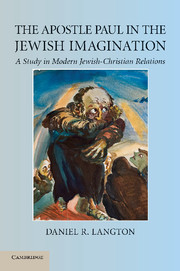Book contents
- Frontmatter
- Contents
- Acknowledgments
- Introduction
- PART I THE APOSTLE PAUL AND POPULAR JEWISH CULTURAL IDENTITY
- 1 Paul in the Popular Jewish Imagination
- PART II THE APOSTLE PAUL AND JEWISH RELIGIOUS IDENTITY: NEW TESTAMENT STUDIES AND THEOLOGICAL APPROACHES
- PART III THE APOSTLE PAUL AND JEWISH INTEREST IN THE JUDEO-CHRISTIAN TRADITION: ARTISTIC AND LITERARY APPROACHES
- PART IV THE APOSTLE PAUL AND JEWISH CRITIQUES OF THE PLACE OF RELIGION IN SOCIETY: PHILOSOPHICAL AND PSYCHOANALYTICAL APPROACHES
- Conclusion
- Appendix: The Story of Abbu Gulish in The Book of Tales
- Bibliography
- Scripture and Other Ancient Writings Index
- General Index
- References
1 - Paul in the Popular Jewish Imagination
Published online by Cambridge University Press: 07 May 2010
- Frontmatter
- Contents
- Acknowledgments
- Introduction
- PART I THE APOSTLE PAUL AND POPULAR JEWISH CULTURAL IDENTITY
- 1 Paul in the Popular Jewish Imagination
- PART II THE APOSTLE PAUL AND JEWISH RELIGIOUS IDENTITY: NEW TESTAMENT STUDIES AND THEOLOGICAL APPROACHES
- PART III THE APOSTLE PAUL AND JEWISH INTEREST IN THE JUDEO-CHRISTIAN TRADITION: ARTISTIC AND LITERARY APPROACHES
- PART IV THE APOSTLE PAUL AND JEWISH CRITIQUES OF THE PLACE OF RELIGION IN SOCIETY: PHILOSOPHICAL AND PSYCHOANALYTICAL APPROACHES
- Conclusion
- Appendix: The Story of Abbu Gulish in The Book of Tales
- Bibliography
- Scripture and Other Ancient Writings Index
- General Index
- References
Summary
In the post-Holocaust, post–Vatican II world of ecumenicalism and interfaith relations much has been written about Jewish views of Jesus, including works that approach the subject from a cultural perspective, drawing upon literature and artwork. Relatively little has been written about Jewish views of the apostle Paul, and what has been written tends to address the interests and concerns of theologians and New Testament scholars. In what follows, the role of the Apostle to the Gentiles in the popular Jewish imagination will be approached from a sociocultural perspective. The idea of a Jewish tradition of hostility towards Paul will be queried before the argument is made that popular awareness of the apostle had its origins in the nineteenth century. Drawing upon the weekly Jewish Chronicle as a useful indicator of public opinion, in Britain at least, some tentative suggestions for the different roles Paul has played in modern popular discourse will also be offered.
THE MYTH OF A JEWISH TRADITION OF HOSTILITY TOWARDS PAUL
The Reconstructionist rabbi Nancy Fuchs-Kreimer once observed in an imaginary letter to Paul, as one rabbi to another, that
Most of my co-religionists, from your era right up till mine, see you as the archetype of the Jewish heretic, the prototypical Jew who abandons the faith and then unjustly criticizes it in a way our enemies can use against us, to put it bluntly – a traitor.
- Type
- Chapter
- Information
- The Apostle Paul in the Jewish ImaginationA Study in Modern Jewish-Christian Relations, pp. 23 - 54Publisher: Cambridge University PressPrint publication year: 2010



